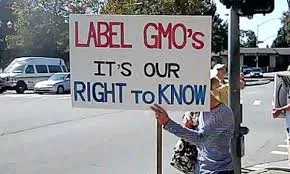In this last in a series on GMO’s, I take a look at how the average American is in the dark about these products that have been thrust into our food supply. Most developed nations do not consider GMOs to be safe.
In more than 60 countries around the world, including Australia, Japan, and all of the countries in the European Union, there are significant restrictions or outright bans on the production and sale of GMOs. In the U.S., the government has approved GMOs based on studies conducted by the same corporations that created them and profit from their sale.
Unfortunately, even though polls  consistently show that a significant majority of Americans want to know if the food they’re purchasing contains GMOs, the powerful biotech lobby has succeeded in keeping this information from the public. Another primary concern about GMO’s is preventing genetically modified versions from mixing with the naturally existing populations of plants from which they're derived. Plants rely on the transfer of pollen, via insects or the air, to breed and produce offspring, and it's difficult to control how they cross-breed in the wild. In most cases, it's not yet clear how introduction of the non-native gene would affect wild populations.
consistently show that a significant majority of Americans want to know if the food they’re purchasing contains GMOs, the powerful biotech lobby has succeeded in keeping this information from the public. Another primary concern about GMO’s is preventing genetically modified versions from mixing with the naturally existing populations of plants from which they're derived. Plants rely on the transfer of pollen, via insects or the air, to breed and produce offspring, and it's difficult to control how they cross-breed in the wild. In most cases, it's not yet clear how introduction of the non-native gene would affect wild populations.
Critics of genetically modified plant technology cite the need to learn more about the potential long-term impacts of genetically modified plants on the environment before mass-producing them. Couple that with the fact that many people suffer from allergies to various food items, including nuts, wheat, eggs, or dairy products. There is concern that the protein products of introduced genes may be toxic or allergenic to certain individuals.  Vermont last year became the first state to require mandatory labeling, starting in 2016. The law has been challenged in court by the Grocery Manufacturers Association and other groups. Connecticut and Maine have both passed laws to require labeling, but they have yet to take effect. More than a dozen other states are considering similar oversight.
Vermont last year became the first state to require mandatory labeling, starting in 2016. The law has been challenged in court by the Grocery Manufacturers Association and other groups. Connecticut and Maine have both passed laws to require labeling, but they have yet to take effect. More than a dozen other states are considering similar oversight.
To my surprise, the Senate blocked a bill that would have set voluntary labeling standards for genetically modified foods but would also have barred states like Vermont from setting their own rules. Republicans argued that companies will soon face a morass of competing label laws that will raise costs for firms and prices for consumers and frighten Americans unnecessarily. Senate Majority Leader Mitch McConnell (R-Ky.) said the bill was “aimed at protecting middle-class families from unfair higher food prices” and argued that calls for labeling were based on unfounded fears of genetically engineered foods. The measure failed to pass a procedural vote, falling 48 to 49.
The measure failed to pass a procedural vote, falling 48 to 49.
Sen. Debbie Stabenow (Mich.), the top Democrat on the Senate Agriculture Committee opposed the bill on the grounds that Americans should be able to learn easily what they are buying to feed their families. “A growing number of American consumers want to know more about the food they eat,” Stabenow said. “And they have the right to know. They have the right to know what is in their food.” Not all senators, or even all Republicans, were prepared to concede GMOs were safe.
It seems to me that it's not the job of government to protect a business from the free market system of informed consumers. If companies fight tooth and nail to keep people from knowing where their food is coming from, there's something to hide; but what business does government have in protecting companies from consumer demand for more transparency? The fact of the matter is that they perceive they'll lose market if it's revealed they have GMO in their product. The notion that labels would drive food prices up is a smokescreen. But once again the problem is not necessarily the genetic engineering. The problem is the product has been engineered to resist certain pesticides that wind up in your food. Informing people only gives them choices. Feel free to leave comments and be sure to hit the “Like” button at the end of this post.






